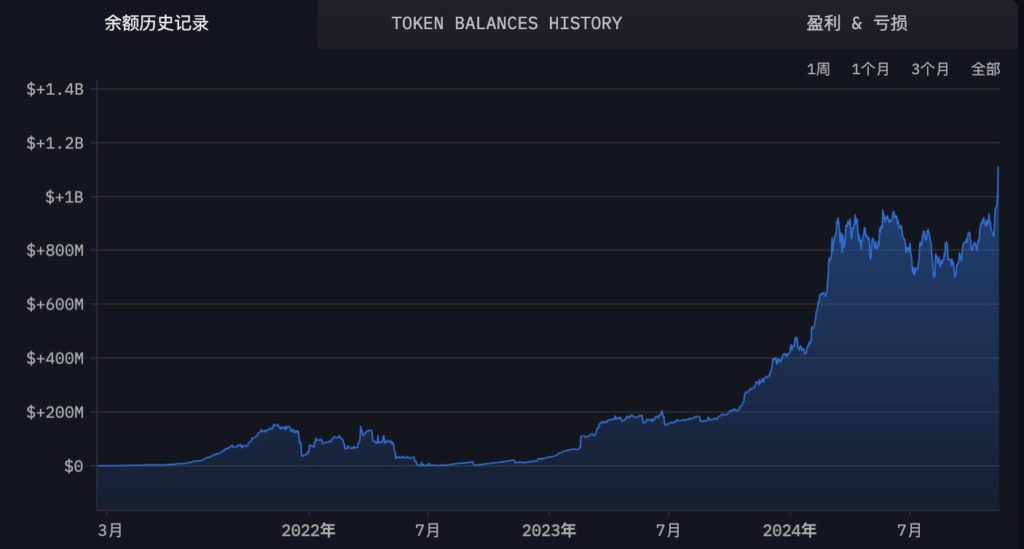The population is only 800,000, but it has over 12,000 Bitcoins, this small country at the southern foot of the Himalayas has attracted global attention with its bold Bitcoin investment strategy.
As Bitcoin enters a new upward cycle, the national-level Bitcoin "Pixiu" in countries like Bhutan are reaping bountiful returns. At the same time, as major economies like the US gradually adopt a more positive and open attitude towards Bitcoin, it is expected that more countries will include Bitcoin as a national reserve asset in the future.
A holding scale of over $110 million, involved in Bitcoin mining years ago
Bhutan is rapidly accumulating wealth through its Bitcoin mining business, becoming an important player in the crypto market.
According to Arkham data, the Bhutanese government conducts mining through multiple mining pools such as AntPool, Braiins and Foundry. As of November 13, the Kingdom of Bhutan holds 12,576 Bitcoins, worth over $110 million. From the known government holding scale, Bhutan ranks fourth in Bitcoin holdings, behind the US, China and the UK.

This holding scale is quite astonishing. Calculated based on Bhutan's $2.89 billion GDP in 2022, the value of its Bitcoin holdings exceeds one-third of the country's GDP. In comparison, El Salvador (population 6.4 million) holds $50 million in Bitcoin, which is less than 1.5% of its $34.02 billion GDP in 2023.
Unlike most countries that acquire Bitcoin through asset seizures, Bhutan's Bitcoin comes from its active participation in Bitcoin mining. PANews previously reported that Bhutan has one of the world's largest hydroelectric power reserves, giving it a unique advantage in Bitcoin mining. Bhutan is an "early entrant", having been heavily involved in Bitcoin mining for several years, with government representatives revealing that Bhutan "started mining Bitcoin when the price was around $5,000".
In 2023, Bhutan's investment arm Druk Holding & Investments teamed up with a listed mining company Bit Digital to launch a $50 million crypto mining fund, aiming to build a zero-carbon crypto mining base in Bhutan using its abundant hydropower. Druk Holding & Investments CEO Ujjwal Deep Dahal also explained that mining is the lowest-risk way for Bhutan to participate in the crypto field, and the country will currently focus on Bitcoin mining.
On-chain data also confirms this. Arkham's tracking data shows that Bhutan has been involved in the crypto field since at least February 2021. At that time, Bhutan received its first Bitcoin of 0.0267 BTC from AntPool, worth about $1,280 at the time, which may have been Bhutan's first foray into Bitcoin mining. Since then, Bhutan has been regularly transferring some of its Bitcoins to exchanges, especially since the second half of last year, when Bhutan would transfer hundreds or even thousands of Bitcoins to trading platforms almost monthly.
In addition to mining, Bhutan has also engaged in large-scale capital flows with multiple crypto platforms. According to public data, Bhutan's total crypto transactions with platforms like BlockFi, Celsius and Hodlnaut exceed $80 million, covering various crypto assets such as Bitcoin, Ethereum and stablecoins.
Inclusion of Bitcoin in national reserves may become a trend
As the value of Bitcoin continues to rise, more and more countries are starting to pay attention to and value this crypto asset, with Bhutan and El Salvador being typical examples.
In fact, over the past period, multiple countries around the world have had initiatives to include Bitcoin in their national reserve assets. For example, the president-elect Trump had promised to list Bitcoin as a strategic reserve asset, and Trump's inauguration and the crypto-friendly US political landscape have greatly increased the possibility of this idea becoming a reality.
Venezuelan opposition leader María Corina Machado also proposed the establishment of a national Bitcoin reserve system in the second half of this year, stating that Bitcoin is a "key component" in rebuilding Venezuela's economic and financial system, providing a "lifeline" for the Venezuelan people to bypass the government-controlled exchange rate.
Hong Kong Legislative Council member Junius Ho also tweeted a few months ago that Bitcoin and Web3 are important nodes in the development of globalization, and should be encouraged for global development. In the future, under compliance conditions, it can be considered to include Bitcoin in the strategic financial reserves of a country or region. He believes that the SAR government will responsibly and progressively open up the market.
It is worth mentioning that due to the German government's sale of 50,000 Bitcoins this summer, the country missed out on at least $150 million in profits. In October, Bitcoin supporter Samson Mow was invited to speak at the German Bundestag, discussing issues related to a national-level Bitcoin strategy, and proposed that he hopes Germany will include its held Bitcoins in its strategic reserves.
Leaders in various crypto industries have also made predictions about this trend. For example, Binance founder CZ predicted that many countries will use Bitcoin as a reserve, including other cryptocurrencies; Bitcoin Magazine CEO David Bailey recently disclosed on social media that at least one sovereign state is actively acquiring Bitcoin and has already ranked among the top five holders; Satoshi Action Fund founder Dennis Porter said he has received calls from 5 different countries about Bitcoin strategic reserve issues, hoping he will draft regulations to establish strategic Bitcoin reserves. He also emphasized that "the success we have achieved in the US through legislation can now be exported around the world."
Crypto analyst PlanB also analyzed that from March 2025, countries like Bhutan, Argentina and Dubai are expected to successively adopt Bitcoin as legal tender, and from April, the US will also launch a Bitcoin strategic reserve under Trump's push. Other countries will follow suit, especially non-EU countries will join this wave.






